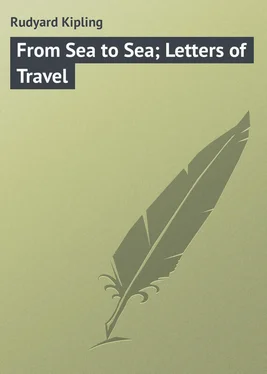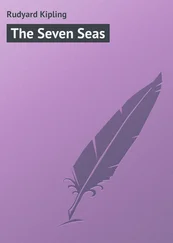Rudyard Kipling - From Sea to Sea; Letters of Travel
Здесь есть возможность читать онлайн «Rudyard Kipling - From Sea to Sea; Letters of Travel» — ознакомительный отрывок электронной книги совершенно бесплатно, а после прочтения отрывка купить полную версию. В некоторых случаях можно слушать аудио, скачать через торрент в формате fb2 и присутствует краткое содержание. Жанр: foreign_prose, foreign_language, на английском языке. Описание произведения, (предисловие) а так же отзывы посетителей доступны на портале библиотеки ЛибКат.
- Название:From Sea to Sea; Letters of Travel
- Автор:
- Жанр:
- Год:неизвестен
- ISBN:нет данных
- Рейтинг книги:5 / 5. Голосов: 1
-
Избранное:Добавить в избранное
- Отзывы:
-
Ваша оценка:
- 100
- 1
- 2
- 3
- 4
- 5
From Sea to Sea; Letters of Travel: краткое содержание, описание и аннотация
Предлагаем к чтению аннотацию, описание, краткое содержание или предисловие (зависит от того, что написал сам автор книги «From Sea to Sea; Letters of Travel»). Если вы не нашли необходимую информацию о книге — напишите в комментариях, мы постараемся отыскать её.
From Sea to Sea; Letters of Travel — читать онлайн ознакомительный отрывок
Ниже представлен текст книги, разбитый по страницам. Система сохранения места последней прочитанной страницы, позволяет с удобством читать онлайн бесплатно книгу «From Sea to Sea; Letters of Travel», без необходимости каждый раз заново искать на чём Вы остановились. Поставьте закладку, и сможете в любой момент перейти на страницу, на которой закончили чтение.
Интервал:
Закладка:
A small volume might be written of the ways and the tales of Indian loafers of the more brilliant order – such Chevaliers of the Order of Industry as would throw their glasses in your face did you call them loafers. They are a genial, blasphemous, blustering crew, and preëminent even in a land of liars.
XIII
A KING'S HOUSE AND COUNTRY. FURTHER CONSIDERATION OF THE HAT-MARKED CASTE.
The hospitality that spreads tables in the wilderness, and shifts the stranger from the back of the hired camel into a two-horse victoria, must be experienced to be appreciated.
To those unacquainted with the peculiarities of the native-trained horse, this advice may be worth something. Sit as far back as ever you can, and, if Oriental courtesy have put an English bit and bridoon in a mouth by education intended for a spiked curb, leave the whole contraption alone. Once acquainted with the comparative smoothness of English iron-mongery, your mount will grow frivolous. In which event a four-pound steeplechase saddle, accepted through sheer shame, offers the very smallest amount of purchase to untrained legs.
The Englishman rode up to the Fort, and by the way learnt all these things and many more. He was provided with a racking, female horse who swept the gullies of the city by dancing sideways.
The road to the Fort, which stands on the Hill of Strife, wound in and out of sixty-foot hills, with a skilful avoidance of all shade; and this was at high noon, when puffs of heated air blew from the rocks on all sides. "What must the heat be in May?" The Englishman's companion was a cheery Brahmin, who wore the lightest of turbans and sat the smallest of neat little country-breds. "Awful!" said the Brahmin. "But not so bad as in the district. Look there!" and he pointed from the brow of a bad eminence, across the quivering heat-haze, to where the white sand faded into bleach blue sky and the horizon was shaken and tremulous. "It's very bad in summer. Would knock you – oh yes – all to smash, but we are accustomed to it." A rock-strewn hill, about half a mile, as the crow flies, from the Fort was pointed out as the place whence, at the beginning of this century, the Pretender Sowae besieged Raja Maun for five months, but could make no headway against his foe. One gun of the enemy's batteries specially galled the Fort, and the Jodhpur King offered a village to any of his gunners who should dismount it. "It was smashed," said the Brahmin. "Oh yes, all to pieces." Practically, the city which lies below the Fort is indefensible, and during the many wars of Marwar has generally been taken up by the assailants without resistance.
Entering the Fort by the Jeypore Gate, and studiously refraining from opening his umbrella, the Englishman found shadow and coolth, took off his hat to the tun-bellied, trunk-nosed God of Good-Luck who had been very kind to him in his wanderings, and sat down near half a dozen of the Maharaja's guns bearing the mark, "A. Broome, Cossipore, 1857," or "G. Hutchinson, Cossipore, 1838." Now rock and masonry are so curiously blended in this great pile that he who walks through it loses sense of being among buildings. It is as though he walked through mountain-gorges. The stone-paved, inclined planes, and the tunnel-like passages driven under a hundred feet height of buildings, increase this impression. In many places the wall and rock runs up unbroken by any window for forty feet.
It would be a week's work to pick out even roughly the names of the dead who have added to the buildings, or to describe the bewildering multiplicity of courts and ranges of rooms; and, in the end, the result would be as satisfactory as an attempt to describe a nightmare. It is said that the rock on which the Fort stands is four miles in circuit, but no man yet has dared to estimate the size of the city that they call the Palace, or the mileage of its ways. Ever since Ras Joda, four hundred years ago, listened to the voice of a Jogi , and leaving Mundore built his eyrie on the "Bird's nest" as the Hill of Strife was called, the Palaces have grown and thickened. Even to-day the builders are still at work. Takht Singh, the present ruler's predecessor, built royally. An incomplete bastion and a Hall of Flowers are among the works of his pleasure. Hidden away behind a mighty wing of carved red sandstone lie rooms set apart for Viceroys, Durbar Halls and dinner-rooms without end. A gentle gloom covers the evidences of the catholic taste of the State in articles of "bigotry and virtue"; but there is enough light to show the raison d'être of the men who wait in the dak-bungalow. And, after all, what is the use of Royalty in these days if a man may not take delight in the pride of the eye? Kumbha Rana, the great man of Chitor, fought like a Rajput, but he had an instinct which made him build the Tower of Victory at, who knows what cost of money and life. The fighting-instinct thrown back upon itself must have some sort of outlet; and a merciful Providence wisely ordains that the Kings of the East in the nineteenth century shall take pleasure in shopping on an imperial scale. Dresden China snuff-boxes, mechanical engines, electro-plated fish-slicers, musical boxes, and gilt blown-glass Christmas-tree balls do not go well with the splendours of a Palace that might have been built by Titans and coloured by the morning sun. But there are excuses to be made for Kings who have no fighting to do.
In one of the higher bastions stands a curious specimen of one of the earliest mitrailleuses – a cumbrous machine carrying twenty gun-barrels in two rows, which small-arm fire is flanked by two tiny cannon. As a muzzle-loading implement its value after the first discharge would be insignificant; but the soldiers lounging by assured the Englishman that it had done good service in its time.
A man may spend a long hour in the upper tiers of the Palaces, but still far from the roof-tops, in looking out across the desert. There are Englishmen in these wastes, who say gravely that there is nothing so fascinating as the sand of Bikanir and Marwar. "You see," explained an enthusiast of the Hat-marked Caste, "you are not shut in by roads, and you can go just as you please. And, somehow, it grows upon you as you get used to it, and you end, y'know, by falling in love with the place." Look steadily from the Palace westward where the city with its tanks and serais is spread at your feet, and you will, in a lame way, begin to understand the fascination of the Desert which, by those who have felt it, is said to be even stronger than the fascination of the Road. The city is of red sandstone and dull and sombre to look at. Beyond it, where the white sand lies, the country is dotted with camels limping into the Eiwigkeit or coming from the same place. Trees appear to be strictly confined to the suburbs of the city. Very good. If you look long enough across the sands, while a voice in your ear is telling you of half-buried cities, old as old Time, and wholly unvisited by Sahibs, of districts where the white man is unknown, and of the wonders of far-away Jeysulmir ruled by a half-distraught king, sand-locked and now smitten by a terrible food and water famine, you will, if it happen that you are of a sedentary and civilised nature, experience a new emotion – will be conscious of a great desire to take one of the lobbing camels and get away into the desert, away from the last touch of To-day, to meet the Past face to face. Some day a novelist will exploit the unknown land from the Rann, where the wild ass breeds, northward and eastward, till he comes to the Indus.
But the officials of Marwar do not call their country a desert. On the contrary, they administer it very scientifically and raise, as has been said, about thirty-eight lakhs from it. To come back from the influence and the possible use of the desert to more prosaic facts. Read quickly a rough record of things in modern Marwar. The old is drawn in Tod, who speaks the truth. The Maharaja's right hand in the work of the State is Maharaj Sir Pertab Singh, Prime Minister A. – D. – C. to the Prince of Wales, capable of managing the Marwari who intrigues like a – Marwari, equally capable, as has been seen, of moving in London Society, and Colonel of a newly raised crack cavalry corps. The Englishman would have liked to have seen him, but he was away in the desert somewhere, either marking a boundary or looking after a succession case. Not very long ago, as the Setts of Ajmir knew well, there was a State debt of fifty lakhs. This has now been changed into a surplus of three lakhs, and the revenue is growing. Also, the simple Dacoit who used to enjoy himself very pleasantly, has been put into a department, and the Thug with him.
Читать дальшеИнтервал:
Закладка:
Похожие книги на «From Sea to Sea; Letters of Travel»
Представляем Вашему вниманию похожие книги на «From Sea to Sea; Letters of Travel» списком для выбора. Мы отобрали схожую по названию и смыслу литературу в надежде предоставить читателям больше вариантов отыскать новые, интересные, ещё непрочитанные произведения.
Обсуждение, отзывы о книге «From Sea to Sea; Letters of Travel» и просто собственные мнения читателей. Оставьте ваши комментарии, напишите, что Вы думаете о произведении, его смысле или главных героях. Укажите что конкретно понравилось, а что нет, и почему Вы так считаете.












